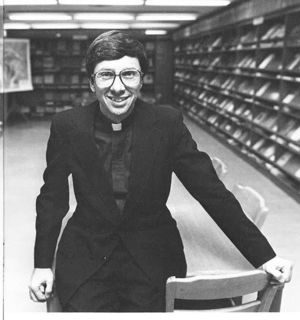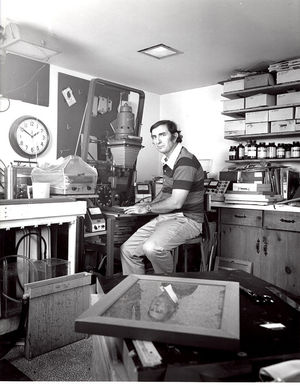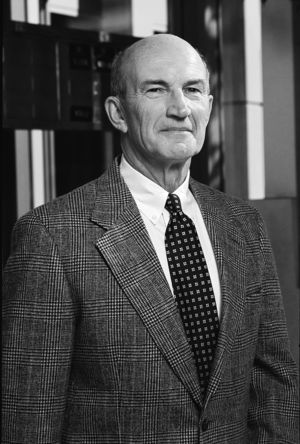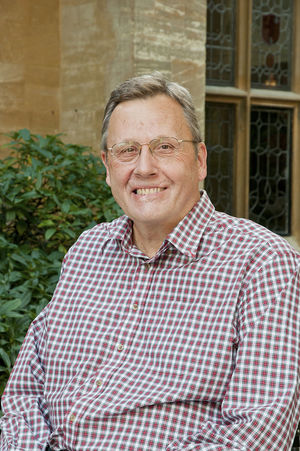Rev. Ernest J. Bartell, CSC, ’53 was a scholar who applied his intellectual acuity to economic justice, an administrator whose vision guided several organizations in service to humanity and a priest whose personal and pastoral qualities touched the lives of many people.
A native of Chicago, Bartell earned a master’s degree in economics from the University of Chicago and a doctorate in economics from Princeton. He then joined the faculty at Notre Dame, where he taught and conducted research on the intersections between economics, Catholic social teaching and education. He chaired the economics department for three years and led the University’s Center for the Study of Man in Contemporary Society.

Ordained a priest in 1961, Bartell helped establish Notre Dame’s first international service program for undergraduate volunteers, the Community for the International Lay Apostolate, a program he served for 12 years.
A perceptive leader, he became president of Stonehill College, a Congregation of Holy Cross school in Easton, Massachusetts, in 1971. In 1977, he was appointed director of the Fund for the Improvement of Postsecondary Education within the U.S. Department of Health, Education, and Welfare.
The priest returned to Notre Dame as the inaugural director of the Kellogg Institute for International Studies, which he led until his retirement in 1997, elevating Kellogg’s reputation as a center for the study of democracy and human development, particularly in Latin America. “All of Kellogg’s success in attracting great minds, generating seminal ideas and putting Notre Dame on the map in Latin America flowed from” his leadership, wrote Michael Coppedge, a Kellogg faculty fellow and professor of political science, for a 2016 event honoring the priest. “Everyone associated with the Kellogg Institute owes him a big debt.”
Bartell, who died in April at age 88, had been a Notre Dame trustee and fellow and had served on the boards of other Catholic colleges and universities, receiving a number of honorary degrees. “Father Ernie Bartell was my personal mentor when I was considering applying to Holy Cross and becoming a priest,” said Rev. Edward “Monk” Malloy, CSC, ’63, ’67M.A., ’69M.A., Notre Dame president emeritus. “Ernie was very smart, full of energy, generous and kind. He was a successful president at Stonehill College and a visionary leader at the Kellogg Institute. He had a long and productive life in ministry.”

Dick Stevens ’51, ’52M.A. studied English literature at Notre Dame, pursued a doctorate at the University of Chicago, served as a seaman 1st class in the U.S. Navy, then taught photography at Notre Dame for 38 years. He introduced photography into the University’s art curriculum in 1970 and was dedicated to imparting his craft to his students, many of whom stayed in touch over the years.
Stevens viewed life through the lens, contributing images to this magazine and other editorial publications, as well as advertising agencies and art museums throughout the United States. He wrote two books on old-process photography and two on reading and discussing the Great Books. The Chicago native, fond of the city and its more troubled neighborhoods, visited often to practice his art and capture the dynamic cityscape.
Having worked almost exclusively in black and white, he closed up his darkroom when he retired in 1993. He soon moved to Florida, where he embraced digital photography and began working in color to capture the brilliant light on tropical botanicals. His love of architecture and street photography continued, and he composed colorful abstract images of graffiti and paint splashes on rusting metal.
When not photographing, Stevens enjoyed sailing on Sarasota Bay and playing bridge. His activities continued until two years ago when the ravages of Parkinson’s disease caused him to be an observer. “His curiosity continued,” said Becky, his wife of 52 years, “as he enjoyed watching the play of light on neighboring houses as the sun began to set or turning a single blossom on the breakfast table to catch the morning light.” Stevens died March 27, one month shy of his 92nd birthday.

Edward R. Trubac, an associate professor emeritus of finance, died April 16 in South Bend. He was 84.
Trubac is remembered as a dedicated professor and administrator, a loyal friend and colleague. “For everybody Ed met, he was trying to determine what he could do for them, to help make their life better, to help them grow as a teacher and a professor,” said William P. Sexton, a former business school faculty member who retired from Notre Dame as vice president for university relations and was friends with Trubac for more than 50 years.
Born in New York City, the macroeconomist earned a bachelor’s degree from Manhattan College and his master’s and doctoral degrees from Syracuse University. His expertise included economic forecasting, nonprofit organizations and economic growth.
Trubac’s classes were always in demand, and they weren’t considered easy. “He was tough, but he was so good,” Sexton said. “Students who left his classes always felt they could not have received a better education.”
Trubac enjoyed teaching, for which he received numerous honors, including the Joyce Award for Excellence in Undergraduate Teaching and the Leo Burke Outstanding Teaching Award for faculty in the Executive MBA-Chicago program.
He arrived at Notre Dame in 1960 to teach in the finance department and later served as department chair and an associate dean of the Mendoza College of Business. He also held the inaugural Thomas A. and James J. Bruder Chair for Administrative Leadership, directed what is now the Master of Nonprofit Administration program and led the Center for Research in Banking.
Trubac is survived by his wife of 62 years, Maureen, two children and seven grandchildren.
While working toward his doctorate at the London School of Economics in the early 1970s, Gil Loescher, a 6-foot, 8-inch former varsity basketball player at Saint Mary’s College of California, visited Vietnam and Cambodia on a research trip and spent time with war refugees. The experience had a profound effect on him; the plight of refugees became his life’s work.
In 1975, Loescher joined the political science faculty at Notre Dame, where he taught international relations and peace studies for 26 years; he was a fellow of the Kroc Institute for International Peace Studies from its founding in 1986. He continued to visit refugee camps around the world, and his writings and lectures championed displaced people, bringing dignity and compassion into dialogue with law and public policy.

During one such mission, on August 19, 2003, Loescher was on the third floor of Baghdad’s Canal Hotel, visiting Sérgio Vieira de Mello, the United Nations envoy to Iraq. Loescher, representing a London-based geopolitical think tank, had just met with U.S. Ambassador Paul Bremer in Saddam Hussein’s former palace, arriving at the U.N. headquarters just before a terrorist detonated a bomb that killed 22 people and injured 150 others.
Loescher and Vieira de Mello, who used his cellphone to call for help, were the only two in the Brazilian diplomat’s office who initially survived the explosion. Vieira de Mello, the target of the attack, died before rescue workers could extract him from the collapsed building. Loescher survived because severe bleeding had been suppressed as he hung suspended from badly damaged legs — legs soon amputated above the knee by two soldiers using a pocketknife and a saw. “One thought dominated my mind,” Loescher wrote in a 2004 essay for this magazine. “I was determined not to die in the rubble; I would survive and return home to my family.” Flown to a U.S. military hospital in Germany, he was given a 25 percent chance to live.
Undeterred, Loescher continued to work with international humanitarian organizations as well as the U.N. High Commissioner for Refugees, visiting refugee camps in a wheelchair and helping craft U.N. policies on the displaced.
“Gil was a towering figure, physically, professionally and also spiritually,” says Robert Johansen, a former colleague at Notre Dame. “Yet he was kind and even gentle. He was filled with compassion, which he expressed to all, from top U.N. officials to beginning students or faculty members.”
Gilburt D. Loescher, who received an honorary doctorate from Notre Dame in 2006, died in April at age 75, in Oxford, England.